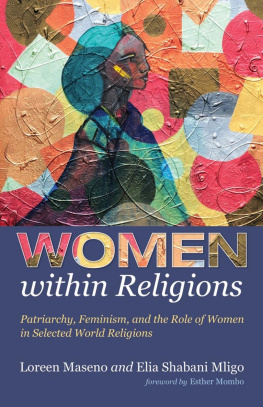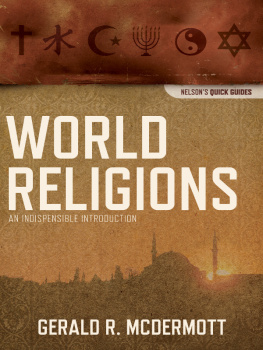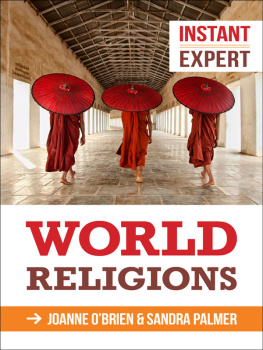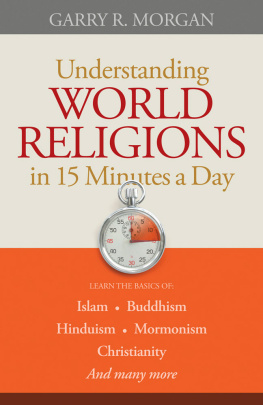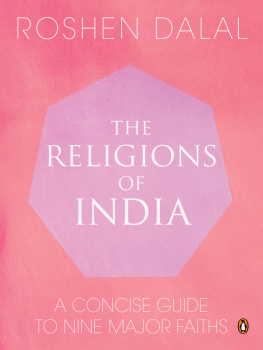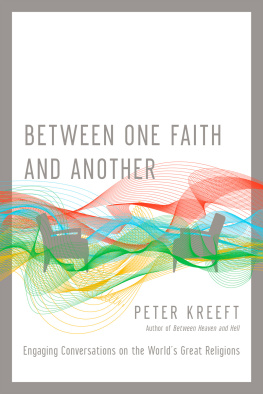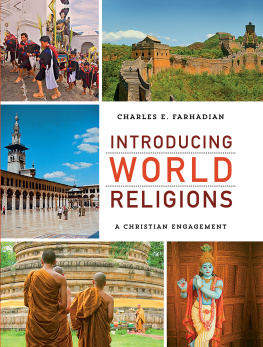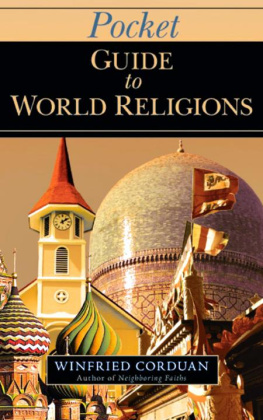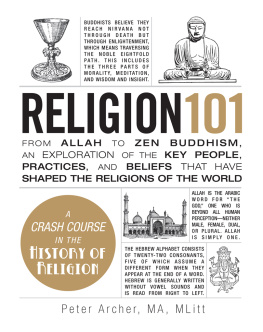Discovering World Religions
A Guide for the Inquiring Reader
Gabriel J. Gomes
iUniverse, Inc.
Bloomington
Discovering World Religions
A Guide for the Inquiring Reader
Copyright 2012 Gabriel J. Gomes
All rights reserved. No part of this book may be used or reproduced by any means, graphic, electronic, or mechanical, including photocopying, recording, taping or by any information storage retrieval system without the written permission of the publisher except in the case of brief quotations embodied in critical articles and reviews.
The views expressed in this work are solely those of the author and do not necessarily reflect the views of the publisher, and the publisher hereby disclaims any responsibility for them.
iUniverse books may be ordered through booksellers or by contacting:
iUniverse
1663 Liberty Drive
Bloomington, IN 47403
www.iuniverse.com
1-800-Authors (1-800-288-4677)
Because of the dynamic nature of the Internet, any web addresses or links contained in this book may have changed since publication and may no longer be valid. The views expressed in this work are solely those of the author and do not necessarily reflect the views of the publisher, and the publisher hereby disclaims any responsibility for them.
Any people depicted in stock imagery provided by Thinkstock are models, and such images are being used for illustrative purposes only.
Certain stock imagery Thinkstock.
ISBN: 978-1-4697-1037-2 (sc)
ISBN: 978-1-4697-1039-6 (e)
iUniverse rev. date: 7/18/2012
Contents
For my mother,
Veronica Maharani Gomes,
who taught me compassion
A journey of discovery can be a thrilling experience. There will be so much to see, to explore, to expand your horizons and to enrich your life. This is equally true of exploring world religions. At the same time, encountering new beliefs and practices can be bewildering by their sheer variety or unfamiliarity. When you not only encounter other peoples religions but also see your own in a historical, objective light, you may have questions you had never considered before. Globalization and the technological revolution have made facing religions of the world unavoidable. Their presence in American society, not to say in your own neighborhood, is bound to raise questions to which you need to find answers. You do not have to accept other peoples religions to appreciate them. Rather, you may consider each religion as peoples attempts to solve some of the recalcitrant problems they face in their personal lives within their social and cultural contexts.
What can you hope to gain from reading this book? Genuine discovery leads to new knowledge. If knowledge is power, then knowing religions of the world will empower you. Learning about alternative ways of dealing with lifes problems, puzzles, and perplexities will endow you with greater confidence and freedom when facing them and enable you to navigate through your life more confidently and joyfully.
Each of us needs to contribute to building a more peaceful and just world. Religions can assist mightily in this endeavor. But they have not done so. One reason for this situation is that most people have not objectively examined other peoples faiths. This has created a breeding ground for misunderstanding and mistrust. But a good knowledge of the worlds religions can lead to a discovery of common ground and shared global perspectives among people of different faiths, as well as an understanding of the uniqueness of each religion. This can move people to come together to identify the worlds most pressing needs, enabling them to create plans to reduce violence, eliminate hunger, alleviate poverty, and promote justice and fairness for all peoples. A first step in this direction is a journey of discovering world religions.
For that to happen, you need to approach each religion with an open mind and a welcoming heart. When the mind is open, insights flood in. Then you come to appreciate religions other than your own. When you discover a shared humanity between your own and other peoples religions, you may return to your own with new insights and exclaim, in the words of the Roman poet Terence, Homo sum, nil humanum alienum a me puto (I am a human being. I consider nothing human to be alien to me).
So you need an experienced guideone that will lead you deftly through the maze of myriad beliefs and practices. The guide will make the experience more rewarding by making even familiar-but-vague ideas clear and palpable with fresh understanding and surprising insights. It will reveal how human beings throughout the world have approached the most fundamental problems confronting them and arrived at different answers because their experience of the world and themselves was different from your own.
From 1963 to 2007 I taught religion at Marymount College, Tarrytown, NY. It was in about 1973 that I initiated a course on world religions at Marymount College. While teaching full time at Marymount College, I also taught a course on world religions at Pace University, Pleasantville, NY, for several years. After Fordham University closed Marymount College in 2007, I taught a course on world religions at Westchester Community College, Valhalla, NY, from 2008 to 2010. And I began teaching humanities, philosophy, and comparative religion at Western Connecticut State University, Danbury, CT, in 2008.
As I began to teach world religions, I became increasingly dissatisfied with existing texts, finding their explanations of central ideas inadequate or misleading, or their interpretations unsatisfactory. Some omit essential ideas because they are deemed difficult. In an effort to simplify teachings for beginners, others make hasty, and consequently false, generalizations. Many texts simply present teachings and practices in their generally accepted standard form without actually analyzing the sacred texts themselves, when doing so would yield deep, new insights that would illuminate those religions. These and many other considerations prompted me to embark on this project.
This book is an outsiders or objective (as opposed to the insiders, or subjective), account of each religion. I am, of course, mindful of whether total objectivity is possible. However, this book is focused mainly on understanding each religion as if from the inside. There is no judgment on the teachings or practices of any religion. Judgment on religions other than ones own is a subjective (or believers) perspective. From the objective standpoint, no judgment is possible simply because there is no completely objective, neutral standpoint from which one can judge the truth or falsity of religions other than ones own.
Rather, my standpoint is affirmative of all religions, as they represent an essential aspect of human attempts in every culture and society, at least in premodern times, to understand themselves and their world and to cope with them. I found that when I approached each religion with an open mind and heart, I began to gain deeper understanding and insight into it. I invite the reader to approach each religion with the same attitude of openness.
However, the objective standpoint is not bereft of a critical perspective in the same way that literary or film critics examine their subject matter. Therefore, I do not avoid the need to point out controversial or negative consequences of some beliefs or practices, especially as they pertain to the social sphere.
Discovering World Religions: A Guide for the Inquiring Reader provides essential knowledge and broad understanding of religion as part of a cultural system that both shapes and in turn is shaped by it. Each chapter is organized around four broad themes common to most religions, which are the following:
Belief in the Sacred in its various manifestations
Next page


